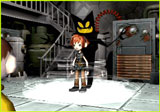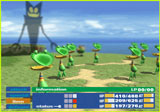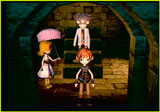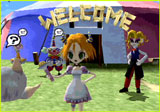 There’s no question that Role
Playing games are in need of a little freshening up. Most of the cut and paste dribble
that slides into the RPG fan’s disk drive is predictable in style and story. As I
fire up a new role-playing game (no matter the title), increasingly, I am haunted by the
feeling that I’ve played this game before. If only I could just remember when,
perhaps I could say something witty or offer some profound insight or clever comparison.
Unfortunately that elusive first time is long gone; in its place I have a jumbled collage
of memories from games that I can no longer tell apart but seem to stretch at least as far
back as the NES. Not much has changed and not everything that’s changed has been for
the better.
There’s no question that Role
Playing games are in need of a little freshening up. Most of the cut and paste dribble
that slides into the RPG fan’s disk drive is predictable in style and story. As I
fire up a new role-playing game (no matter the title), increasingly, I am haunted by the
feeling that I’ve played this game before. If only I could just remember when,
perhaps I could say something witty or offer some profound insight or clever comparison.
Unfortunately that elusive first time is long gone; in its place I have a jumbled collage
of memories from games that I can no longer tell apart but seem to stretch at least as far
back as the NES. Not much has changed and not everything that’s changed has been for
the better. Take for example party size. Back in the day one could reasonably expect to go
dungeon crawling with a sizeable party. Want five or six hard-nosed brawlers to scrap with
the baddies? No problem. Want to try five wizards and one kung fu hero? No problem. Not so
anymore. These days parties have three characters –no more, no less, with little
exception. So we need fixed characters instead of a created party in order to make a
better story. I’m down with that, but why does it always have to be three?
What’s so special about the number three? While technological limitations are one
possible factor, this isn’t an excuse I’m buying anymore. Technology changes but
the games don’t.
Take for example party size. Back in the day one could reasonably expect to go
dungeon crawling with a sizeable party. Want five or six hard-nosed brawlers to scrap with
the baddies? No problem. Want to try five wizards and one kung fu hero? No problem. Not so
anymore. These days parties have three characters –no more, no less, with little
exception. So we need fixed characters instead of a created party in order to make a
better story. I’m down with that, but why does it always have to be three?
What’s so special about the number three? While technological limitations are one
possible factor, this isn’t an excuse I’m buying anymore. Technology changes but
the games don’t.
 What’s
more, this isn’t even the real problem; it’s a symptom of the real problem. The
real culprit is an unwillingness to take chances with something new (give the public what
they want, development is expensive!), and a failure (or cowardice) to think outside the
proverbial box. It is precisely when it manages to think outside the box that Okage
succeeds, while it disappoints when it subscribes to the ho-hum reality of RPG’s. The
originality of Okage comes from the unique story and dialogue, while its ultimate failure
comes from the blah combat system and method of progression.
What’s
more, this isn’t even the real problem; it’s a symptom of the real problem. The
real culprit is an unwillingness to take chances with something new (give the public what
they want, development is expensive!), and a failure (or cowardice) to think outside the
proverbial box. It is precisely when it manages to think outside the box that Okage
succeeds, while it disappoints when it subscribes to the ho-hum reality of RPG’s. The
originality of Okage comes from the unique story and dialogue, while its ultimate failure
comes from the blah combat system and method of progression.
 The
wacky story revolves around our boy hero who’s sister is stricken with a disease that
causes her to speak only in pig Latin. Enter the Demon King Stan, recently freed from his
bottle, who offers to cure the girl if he can live in the poor boy’s shadow.
Stan’s wacky antics are unquestionably the highlight of the game. Convinced that he
is the all-powerful lord of ultimate evil, Stan is unable to come to grips with his own
impotence. Stan spends a great deal of time commanding people to bow down, tremble with
fear, pay him homage, and so forth. Yet Stan is never taken seriously and is generally
regarded as a parlor trick and arouses bursts of laughter instead of trembling knees.
Stan’s appearance sets off a plague of people claiming to be evil kings (who of
course need to be vanquished), and thus the quest begins. The dialogue is generally pretty
interesting, as you play the straight man to Stan’s ranting, comical threats, and
personal jibes. It’s actually kind of strange; Stan’s dialogue seems to be much
better translated than everyone he is speaking to. This either makes the whole situation
more or less comical, depending on your personal tastes, though in either case the problem
is only slight. What’s really bothersome is that the effect seems to fade with time.
After the first eight or nine hours the enjoyable parts have become noticeably less
enjoyable and further apart. In their place comes an increasing reliance on the relatively
mundane battle system.
The
wacky story revolves around our boy hero who’s sister is stricken with a disease that
causes her to speak only in pig Latin. Enter the Demon King Stan, recently freed from his
bottle, who offers to cure the girl if he can live in the poor boy’s shadow.
Stan’s wacky antics are unquestionably the highlight of the game. Convinced that he
is the all-powerful lord of ultimate evil, Stan is unable to come to grips with his own
impotence. Stan spends a great deal of time commanding people to bow down, tremble with
fear, pay him homage, and so forth. Yet Stan is never taken seriously and is generally
regarded as a parlor trick and arouses bursts of laughter instead of trembling knees.
Stan’s appearance sets off a plague of people claiming to be evil kings (who of
course need to be vanquished), and thus the quest begins. The dialogue is generally pretty
interesting, as you play the straight man to Stan’s ranting, comical threats, and
personal jibes. It’s actually kind of strange; Stan’s dialogue seems to be much
better translated than everyone he is speaking to. This either makes the whole situation
more or less comical, depending on your personal tastes, though in either case the problem
is only slight. What’s really bothersome is that the effect seems to fade with time.
After the first eight or nine hours the enjoyable parts have become noticeably less
enjoyable and further apart. In their place comes an increasing reliance on the relatively
mundane battle system.
 The turn
based hack/ slash/ heal affair leaves much to be desired. Through much of this game I kept
thinking of Evolution for the Dreamcast, and the comparison is most apt for the combat
system. The three characters take turns attacking, picking a target, and hopping across
the screen to deliver a good whack before promptly jumping back across the screen to
resume his or her place in formation. Experience is rewarded and items are received in the
usual fashion. Far too soon, I simply lost interest in the combat and henceforth my desire
to keep playing. On the upside, there are no random battles as all enemies are on screen.
You can simple avoid enemies if you wish, but it becomes increasingly difficult to do so
as you successfully evade your foes.
The turn
based hack/ slash/ heal affair leaves much to be desired. Through much of this game I kept
thinking of Evolution for the Dreamcast, and the comparison is most apt for the combat
system. The three characters take turns attacking, picking a target, and hopping across
the screen to deliver a good whack before promptly jumping back across the screen to
resume his or her place in formation. Experience is rewarded and items are received in the
usual fashion. Far too soon, I simply lost interest in the combat and henceforth my desire
to keep playing. On the upside, there are no random battles as all enemies are on screen.
You can simple avoid enemies if you wish, but it becomes increasingly difficult to do so
as you successfully evade your foes.
 Graphically,
Okage looks nice though by no means stunning. It has a certain wacky aesthetic to it and
this helps contribute to the overall vibe of the game, though the PS2 has proven capable
of doing more in the texture department. Still, Okage succeeds graphically because it is
portraying precisely the style it wishes to.
Graphically,
Okage looks nice though by no means stunning. It has a certain wacky aesthetic to it and
this helps contribute to the overall vibe of the game, though the PS2 has proven capable
of doing more in the texture department. Still, Okage succeeds graphically because it is
portraying precisely the style it wishes to.
 Okage is
a respectable effort, and with a more energetic combat system and more consistency in the
enjoyable dialogue, it could have been a heck of a lot better. It’s definitely worth
a look for RPG fans desperate to see a little something different, but for those easily
put off by cumbersome combat systems, Okage is not for you. Younger audiences may well
find the animation and Stan’s eternal quest to be respected as an evil king humorous
and enjoyable, assuming they’re willing to read a lot of dialogue and go for long
stretches without battle early in the game (later in the game the situation is reversed).
Despite all the ups to Okage, I have difficulty giving it an across the board
recommendation because it just didn’t drive me to play, and the ever important fun
factor just wasn’t there for me. Without this, it’s difficult to stay engrossed
in an RPG. Though in all fairness those less familiar with the tried and true RPG system
will likely find significantly less disappointment in the combat system. The bottom line
is, I wanted to like Okage a lot more than I actually did.
Okage is
a respectable effort, and with a more energetic combat system and more consistency in the
enjoyable dialogue, it could have been a heck of a lot better. It’s definitely worth
a look for RPG fans desperate to see a little something different, but for those easily
put off by cumbersome combat systems, Okage is not for you. Younger audiences may well
find the animation and Stan’s eternal quest to be respected as an evil king humorous
and enjoyable, assuming they’re willing to read a lot of dialogue and go for long
stretches without battle early in the game (later in the game the situation is reversed).
Despite all the ups to Okage, I have difficulty giving it an across the board
recommendation because it just didn’t drive me to play, and the ever important fun
factor just wasn’t there for me. Without this, it’s difficult to stay engrossed
in an RPG. Though in all fairness those less familiar with the tried and true RPG system
will likely find significantly less disappointment in the combat system. The bottom line
is, I wanted to like Okage a lot more than I actually did.
